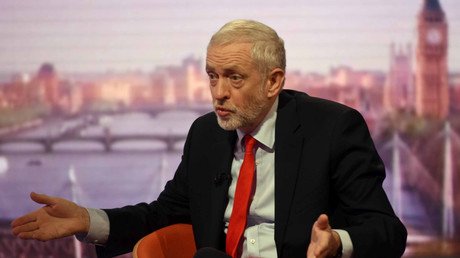Times' lead article questioning govt’s ‘alliance against Russia’ vanishes, but URL remains (VIDEO)

The Times’ lead article from Wednesday, suggesting Theresa May is struggling to hold together an alliance against Russia, has disappeared from its website, with a completely new story under the same URL replacing it.
So, what could have motivated the paper to shelve the story?
The original article, headlined ‘May battles to preserve alliance against Russia’, looked at Prime Minister May’s handling of the Skripal case after chief executive of the Defence Science and Technology Laboratory at Porton Down, Gary Aitkenhead, gave an explosive interview that revealed that the lab had not concluded where the chemical weapon had come from – despite May’s government insisting it was engineered in Russia.
“Downing Street mounted a damage-limitation exercise after Mr Aitkenhead’s comments, saying that Theresa May drew on a comprehensive intelligence assessment alongside the scientific analysis before blaming Russia and insisting that the Porton Down chief had not contradicted this,” the original Times story read.
“However, the interview with Sky News, which had been approved in advance by No 10, risks undermining the international coalition against Moscow.”
The article also quoted German politician Armin Laschet, who questioned Britain’s push to persuade its allies that Russia was to blame. “If one forces nearly all NATO countries into solidarity, shouldn’t one have certain evidence?” Laschet wrote on Twitter.
Wenn man fast alle NATO-Staaten zur Solidarität zwingt, sollte man dann nicht sichere Belege haben? Man kann zu Russland stehen wie man will, aber ich habe im Studium des Völkerrechts einen anderen Umgang der Staaten gelernt. https://t.co/kqMSS2qkhi
— Armin Laschet (@ArminLaschet) April 3, 2018
As a general policy, most news publications do not change URLs once stories are published. This is to ensure that the article maintains maximum traffic and is more ‘searchable’ online. Typically, if a story needs to be pulled from a website, the article will be taken down entirely – not replaced with a story on an entirely different subject matter under the same URL.
The content of the original article disappeared, only to be replaced with a story headlined ‘Johnson under fire after Foreign Office deletes Porton Down tweet’ – and yet the URL has stayed the same: ending in ‘may-battles-to-preserve-alliance-against-russia’. In the replacement story, there is no mention of Theresa May at all.
RT’s Anastasia Churkina suggests it “changes the story and puts the pressure back on Boris Johnson, and no longer questions whether or not possibly Britain has been moving too quickly in this whole case.”
The Times, which is widely regarded as the newspaper of the establishment, has been contacted for comment.
Think your friends would be interested? Share this story!














